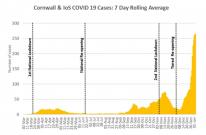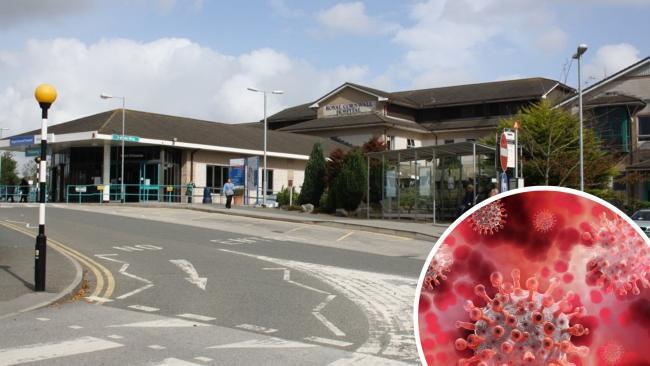Now that hospitals are seeing the impact of the rising rate of coronavirus infection over the last two weeks, health and care professionals in Cornwall are urging local people to support them by keeping to national restrictions and social distancing, to help reduce the virus spreading.
The number of patients in Cornwall’s acute hospitals with a Covid positive diagnosis has more than doubled since the end of December and 18 people have died over the past two weeks.
“It is clear that we are not going to hold onto the relatively low levels of infection we have experienced in Cornwall so far,” said RCHT’s Medical Director, Dr Allister Grant. “We are starting to see more poorly people and are already changing the way we use parts of the hospital. Our local population can really help by doing everything they can to bring down the rate of infection; stay at home and avoid contact with people outside of your household or social bubble.”
The increase in patients with Covid-19 will mean changes to routine appointments for some patients. Many are already benefiting from virtual outpatient clinics, either by telephone or online, reducing the number of people who need to come into the hospitals.
“We recognise making any change to planned appointments is really difficult for patients and it is not a decision we ever take lightly. However, we hope they will understand the need for our staff and our hospitals to focus on the care of those most seriously ill with Covid or other emergency conditions,” adds Allister. “Where we do need to postpone appointments or surgery our clinicians will be reviewing patients on a case by case basis and we will contact everyone individually. Otherwise people should continue to attend as planned, following the guidance in their appointment letter.”
The hospitals are on standby to respond to an increasing number of people with Covid-19 needing their care. Kim O’Keeffe, Interim Director Nursing, Midwifery and Allied Health Professions for Royal Cornwall Hospitals and Cornwall Partnership Foundation Trusts, said: “We are acting as one nursing and care community, to work flexibly and keep patients safe. We’ve already had some great examples where staff have moved to other locations to increase community hospital and even care home capacity. We are also preparing staff to be redeployed into different roles to support frontline services, should the need arise.”
Doctors are keen to stress they are still here for people with urgent conditions not related to Covid-19. Director of Cancer Services, Dr Bryson Pottinger said, “We were all really concerned during the first lockdown that we weren’t seeing the usual number of referrals, not only cancer patients, but other urgent conditions. If anyone is concerned about symptoms, they shouldn’t put off making an appointment with their GP; we’ll still be here at the hospitals to provide diagnostic care and treatment.”
Hi TFor those needing urgent but not emergency care, they should continue to call their GP, or outside of surgery hours contact the 111 services either online www.nhs.uk/111 or by calling 111. Anyone with symptoms of covid-19 should go online or call 119.






Recent comments
35 weeks 2 days ago
37 weeks 19 hours ago
37 weeks 19 hours ago
46 weeks 5 days ago
1 year 6 weeks ago
1 year 31 weeks ago
1 year 41 weeks ago
2 years 1 week ago
3 years 26 weeks ago
4 years 11 weeks ago